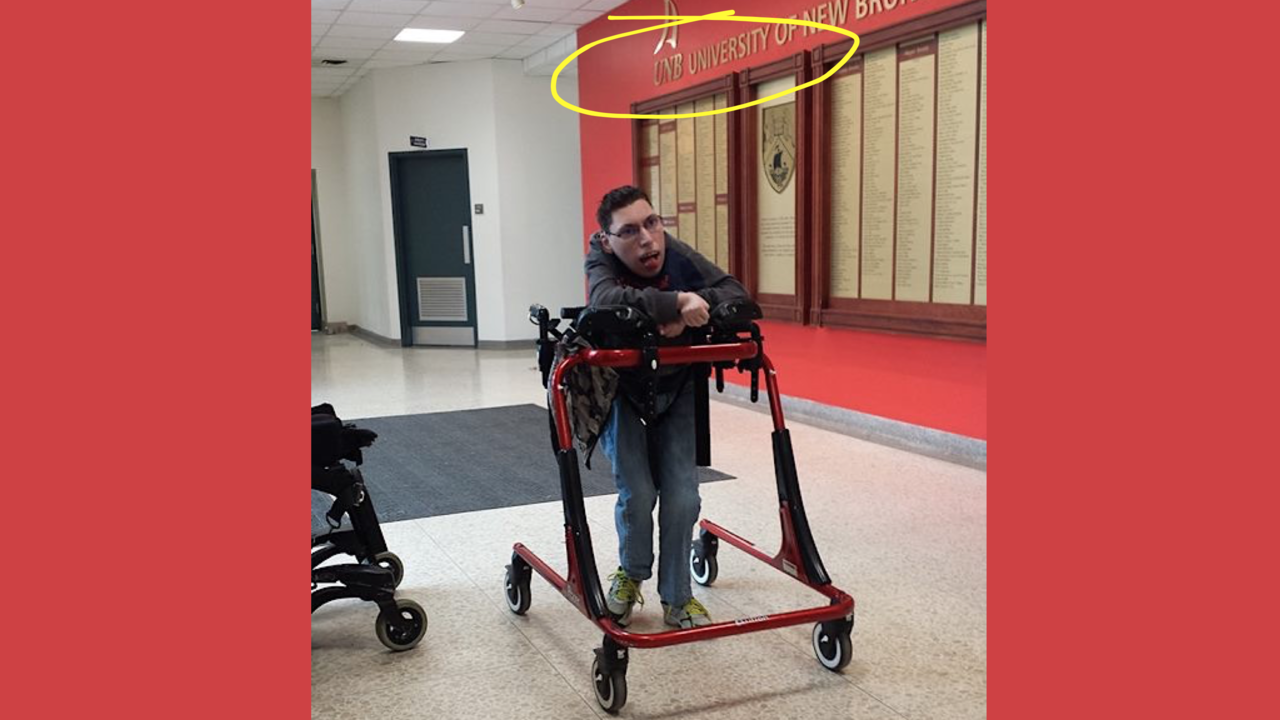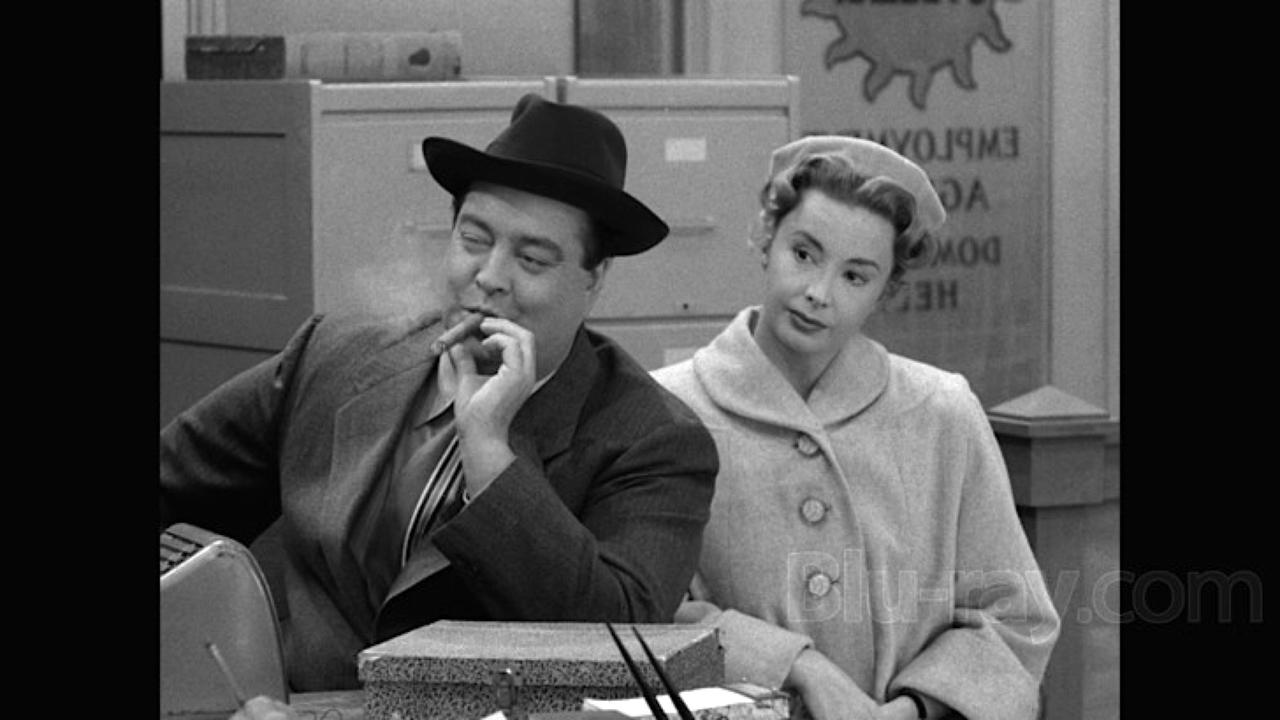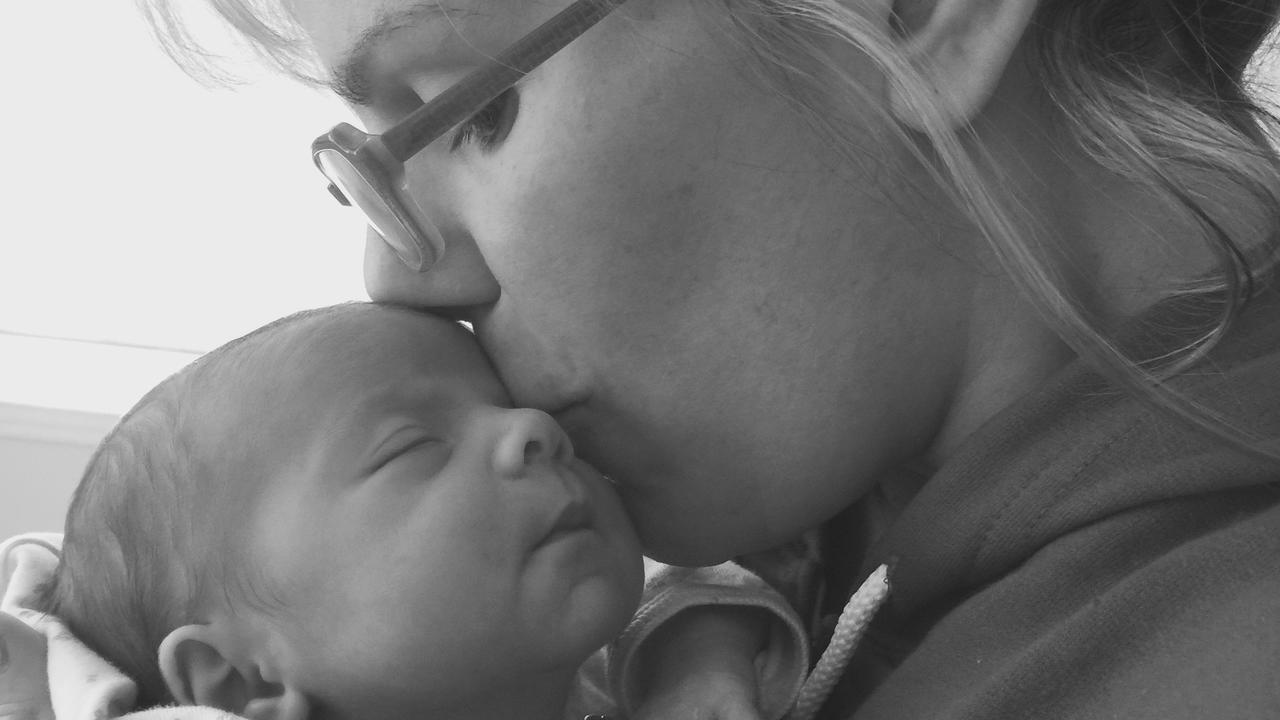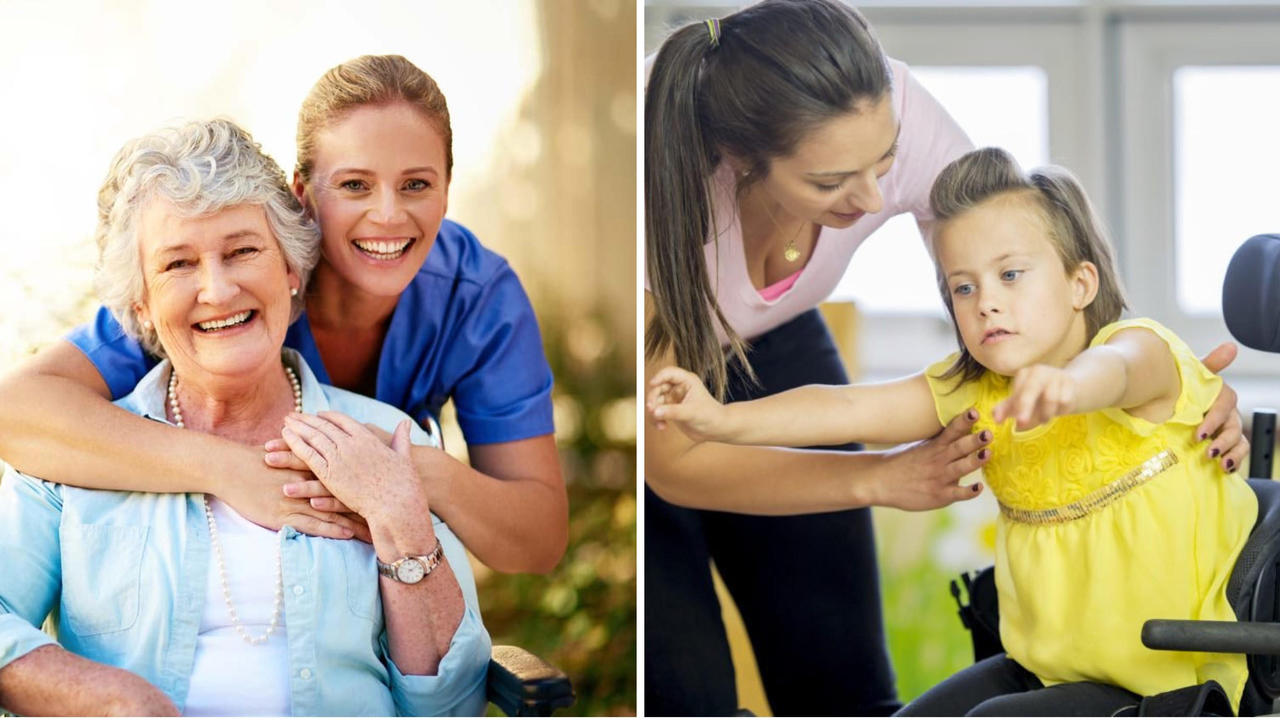"When Did He Start?"

It was a simple enough question that Jan asked.
“September 2013” was the answer.
If I had been quick enough, I would have turned it into a Jeopardy skit:
Jan: “I’ll take Amazing Milestones for $400”.
Me: “The answer: ‘September 2013’”
Jan: “When did Ben start university?”
When Ben was in high school, I remember being asked repeatedly what I thought Ben would be doing once he finished. At the time, I didn’t have a good answer. The options were few.
The fact that he doesn’t walk or talk on his own, and needs a full time assistant, meant getting a job was out of the question.
On the other hand, sitting at home and doing nothing was also a non-starter.
The only possibility that made sense was for Ben to stay in school and continue to learn. It’s what he enjoyed doing. So we looked at community college and university programmes.
That, also, was a non-starter since he didn’t have the academic requirements to be admitted, the result of following a modified learning plan in high sc...
"Can she breathe?"

You’d think after 26 years of living with this stuff I would have found a way for it not to bother me. But it still takes me off my game every now and then.
I guess it’s the psychological damage that comes with discovering that your child, or loved one (or yourself) has a disability or serious health condition.
And the energy it takes to live in a world where you have to fight for everything.
And the worry and uncertainty of what tomorrow will bring.
For me, it’s the unforgettable “he may never walk, talk or go to school”, knife-through-the-heart statement, and everything that goes with it.
Even though none of those things really came true for Ben.
Even though he is just one exam away from graduating … from university!
With 100% certainty, I can tell you that the cure for this funk is to shift focus from what’s lacking (because we will ALWAYS lack something) to what IS.
It's not easy to do. Sometimes you want to wallow in self-pity. But don't!
In Ben’s case, it’s about focusin...
Here’s what having a great caregiver feels like ...

“There’s nothing anyone can do to help you!”
That was more or less the message we were given when Ben arrived in our lives, having been born with severe, complex disabilities.
No one actually said those words, of course, but that was what we were left with at almost every turn.
The conversations were mainly focused on all of Ben’s “problems” and how there really wasn’t a fix to those problems.
It was easy to get caught up in all that negativity, to believe that’s all there was. For a long time, we had no idea what path to follow, or if a path existed at all.
With so few giving us much hope, we relied on brute force to get things done and help Ben succeed.
After a few years of that exhausting pace, where it was just me and Jan against the world, so-to-speak, we realized we needed help. We couldn’t do this all our own.
It wasn’t good for our health.
It wasn’t good for our relationship.
And our kids were certainly not getting the best of their Mom and Dad.
Bringing in a great ca...
“Sir, if you'll not be needing me, I'll close down for a while.”

"Sir, if you'll not be needing me, I'll close down for a while."
Do you know who spoke that line? In what movie? And in what scene?
Send me an email ([email protected]) with the correct answers to all 3 parts … and I’ll give you a free copy of our deluxe edition audio book ![]() !!
!!
Ok, so how many times a week do you just “close down for a while”?
You know, just un-plug, relax, re-charge and stop micromanaging your life or your child’s life?
And when you do close down, what is it that you do? Do you even know how to relax and calm your mind?
If your child or loved one has a complex medical condition or disability, I don’t have to tell you about all the balls you’re juggling … all the time. And how closing down for even an hour is not possible most days.
What I need to tell you is that sometimes … sometimes you have to force yourself to close down, which sounds like an oxymoron – forced relaxation!
Sometimes you just have to cross that bridge and then cut it off behind you, so...
“Catch them doing something right early and often” – Caregiver Leadership 101

So you’ve just hired a caregiver ...
Or maybe you've had someone for a while ...
Or you know someone who relies on a caregiver ...
How do you keep them bringing their best?
Well, consider this obvious fact. Everyone loves to be praised and told they’re doing a good job.
I think that goes without saying.
Some of us might feel a bit uncomfortable when we get a compliment, not really knowing the right thing to say. But we love receiving them, nonetheless.
The problem is that many employers are not really good at giving compliments and pointing out when things go right. And don't forget, you (or your friend) is an employer in this situation.
The tendency is to expect that people will do a good job which means you wind up ignoring those things and focus only on the gaps in their work performance.
Help People Win!
If you’ve ever read any of Ken Blanchard’s writings, you’ll know what I’m talking about.
One of his books is rather brilliant. It’s called, Helping People Win at Work. A...
How do you maintain a balanced relationship with your caregiver?

“Hey, Gladys! Get me a beer!”
A friend asked me what would I do if someone in my extended family – let’s call him Uncle Ralph – talked that way to Ben’s caregiver, Gladys.
I was stumped for a moment, since that has never happened.
But it was a good question and highlighted the importance of knowing where the line should be drawn between keeping the relationship with your caregiver friendly but also professional.
Of course, “get me a beer” is way offside regardless of where that line might be.
An Employee
So, first things first. At the end of the day, you need to remember that Gladys is an employee of yours even if you’re not directly responsible for paying her.
This sets up the dynamic of an employer/employee relationship as well as the responsibilities and respectful behaviours that go along with it.
Hopefully, it’s a wonderful relationship where Gladys loves her job, she actually DOES a wonderful job, and your child or loved one enjoys being with her.
When it’s working well,...
"Take him home and LOVE him!"

A young mom posted online today.
She had just learned that their newborn child was born with complex medical issues which included epilepsy, cerebral palsy, and possible development delays. All the things we were familiar with.
She wanted to know how children in similar situations were doing today.
My first reaction was how amazingly strong was this mom … to have the wherewithal (you just don’t get to use that word often enough ![]() ) AND the energy to post about this devastating, personal discovery.
) AND the energy to post about this devastating, personal discovery.
Not only that but to also look for help right off the bat.
Within seconds, all the feelings and emotions from Ben’s birth 26 years ago became fresh again – things like being told he may not live the day and would likely never walk, talk or go to school.
It’s quite remarkable how these feelings can be resurrected so easily. How they never really go away.
I began remembering what it was like to be back in PICU (paediatric intensive care unit) during that first horrible week after Ben was ...
WARNING: The Dangers of NOT Hiring a Caregiver

When Jan and I were thrust into Ben’s world of 24-hour care with no preparation and, of course, no training, we struggled a lot … which really isn’t surprising.
We were off-balance nearly all the time and had little confidence on what to do next.
Strangely, we thought we were the exception. An outlier. So different from the rest of the world.
After all, people weren’t lining up at our door to help us figure things out. We were pretty much left on our own.
When it came to providing round-the-clock care, it all fell to us. And I would say, that’s probably how we wanted it.
He was our son, after all. Our responsibility. It was up to us to provide the care needed.
But as Ben got older, his level of care remained high. Needless to say, that just goes with the territory in the world of disabilities.
It took us a long time to figure out that we couldn’t do this on our own (or maybe it took me a long time).
A Worldwide Issue
What we didn’t realize was that every day, in just about eve...
"When I See You Smile, I Can Face the World!"
How many times have you searched for answers only to find they were right in front of you the whole time?
(If you answered “Never”, then you really need to keep reading!)
Why does that happen?
Without a doubt, painful or stressful situations take you off your A-game, especially if those situations are unexpected.
If it involves a serious health issue with you, your child or some other loved one, emotions run high, and it’s tough to think clearly.
Your first reaction is to look for ways to stop the pain, right away. It’s only natural.
You want an immediate fix to the problems. But nothing is easy to find.
Too often, the tendency is to over-complicate things. Details and issues all blend together until the problem looks impossible to solve.
That’s when overwhelm sets in. You can feel defeated. And it drains you of energy and hope.
There comes a point, though, when the pressure and the barrage of negativity slows, and you can catch your breath.
When you feel that momentary pause...
Want less stress and more control? Do This!

Yesterday morning began the same as most.
6:30am alarm.
Hit snooze.
Hit snooze, again.
Get up. Unlock the back door for Ben’s assistants. Turn on the kitchen lights and back to the bedroom to get a shower.
I decide to browse my iPhone while waiting for the water to heat up and find an amusing Facebook post.
I start a sarcastic reply and then … SILENCE.
No power! The house is back in darkness. I’m taken off-guard, not really sure what happened. and feel a small wave of anxiety rise inside.
I find the power company’s website and discover that there are 1,500 customers affected by the outage.
Good! It’s not just me. It’s not the whole world, either (maybe that’s where the panic came from). But it would take at least 2 hours for it to be restored.
That's too long to go without power in the winter. So, I throw on a heavy coat and brave the -20C weather to start our generator … which, by the way, isn’t easy to do with arctic winds biting at your face and hands.
The generator is ab...

